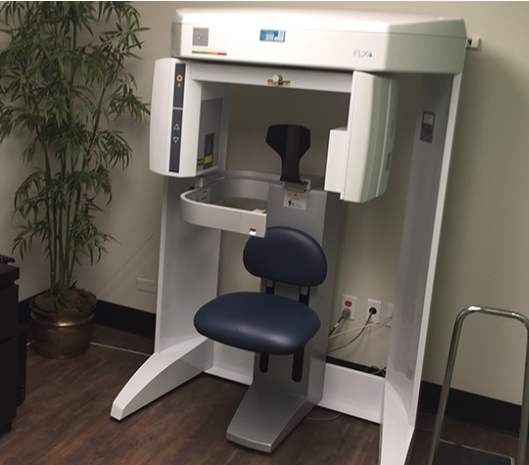Unlocking Precision and Efficiency
Remarkable advancements have been made in dental implant surgery over the years, transforming the way smiles are restored and oral health is improved.
One of the key technologies driving this progress is the use of CAT scan machines. Also known as CT (computed tomography) scanners, these sophisticated imaging devices have revolutionized the field of dental implantology by providing clinicians with accurate, detailed, and three-dimensional insights into a patient’s oral anatomy. They are a night-and-day difference from the old days of traditional x-ray imaging and even digital x-ray technology, first introduced to dentists in the late 1980s.
“I like to use the analogy of a globe versus a 2-dimensional map in explaining the difference between CAT scans and x-rays,” says Dr. John Bruce at the Crofton, MD-based Mugford Center for Periodontics and Dental Implants. Today’s technology produces three-dimensional images of teeth, soft tissues, nerve pathways and bone in a single scan.”
The process is quick and painless for patients. A full-mouth imaging scan typically takes less than 40 seconds for a 360-degree rotation, and less than 10 seconds for scanning only a specific area.
The Mugford Center has invested in the iCAT Cone Beam™, one of the industry’s most trusted systems. According to the University of Louisville School of Dentistry, the advantages of i-CAT™ cone beam is that it “provides unprecedented imaging of the maxillofacial area with less radiation than traditional fan beam computed tomography systems.”
CAT scan machines excel in delivering high-resolution, cross-sectional images of the oral and maxillofacial region. Unlike traditional two-dimensional X-rays, these scans offer a three-dimensional view of the patient’s bone structure, teeth, nerves, and adjacent anatomical features. This level of detail enables clinicians to accurately assess bone density, quality, and available space for implant placement. By having a comprehensive understanding of the patient’s oral anatomy, the professionals at The Mugford Center can develop customized treatment plans that optimize the implant’s position and ensure its long-term success.
“We use the iCAT system to capture 3D images of teeth, roots, TMJs (temporomandibular joints), airways, and sinuses without distortion or magnification,” notes Dr. Bruce. “With the iCAT system, we do not need to create molds because your digital model is right in front of us. We are able to share the images with your other health care providers as needed. They help us to plan the best treatment option for each individual patient.”
The accuracy of implant placement significantly impacts the success and longevity of dental implants. CAT scan machines provide a detailed map of the patient’s bone structure, enabling oral surgeons to choose the optimal implant size, length, and angulation. With this information, they can precisely position the implant within the bone, ensuring optimal contact and stability. Accurate implant placement reduces the likelihood of future complications, such as implant failure or prosthesis misfit, ultimately leading to better patient outcomes.
As we will elaborate on below, precision is key in any type of dental or medical procedure. But that’s not the only benefit overview, the benefits of CAT scanning equipment also include risk mitigation, enhanced safety, efficiencies in time and cost resources and better communications with patients.
Minimized Risk and Enhanced Safety
Dental implant surgery involves navigating through delicate structures such as nerves, blood vessels, and sinuses. The precise imaging provided by CAT scan machines allows clinicians to identify potential obstacles and plan accordingly to avoid complications. This minimizes the risk of inadvertently damaging vital structures during the surgical procedure. The ability to visualize the patient’s anatomy in advance helps dental professionals anticipate challenges and develop strategies to mitigate them, ultimately enhancing patient safety and reducing post-operative complications.
“Additionally, notes Dr. Bruce, “these images can also be used to help identify health problems such as tumors or cysts.”
The Time and Cost Efficiency of CAT Scan Technology
CAT scan machines expedite the treatment process by allowing clinicians to streamline their workflow. Traditional treatment planning might involve multiple appointments and the creation of physical models. With CAT scans, the virtual planning process is faster and more efficient. Additionally, the accurate placement of implants on the first attempt reduces the need for revisions, further saving time for both the patient and the dental team.
Enhanced Patient Communication
The visual nature of three-dimensional images obtained from CAT scan machines aids in patient communication and education. Dentists can use these detailed images to explain the treatment plan, demonstrate potential outcomes, and address any concerns the patient might have. This transparent communication fosters trust between the patient and the dental team, leading to a more positive surgical experience and increased patient satisfaction.
In summary, CAT scan machines have ushered in a new era of precision, safety, and efficiency in dental implant surgery. By providing clinicians with comprehensive three-dimensional images of the patient’s oral anatomy, these advanced imaging devices enhance diagnosis, treatment planning, and implant placement accuracy. With minimized risks, improved patient communication, and streamlined workflows, CAT scan machines contribute to the overall success of dental implant procedures. As technology continues to advance, the benefits of integrating CAT scan machines into dental practice are poised to shape the future of implant dentistry, offering patients more predictable outcomes and confident smiles.
Call our office today to find out more about your candidacy for dental implants and how we might be able to help: (410) 260-0790.

